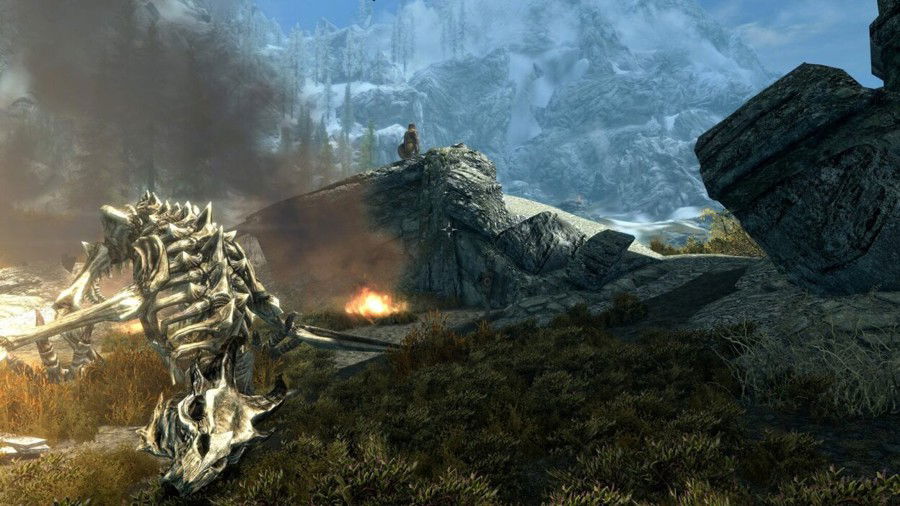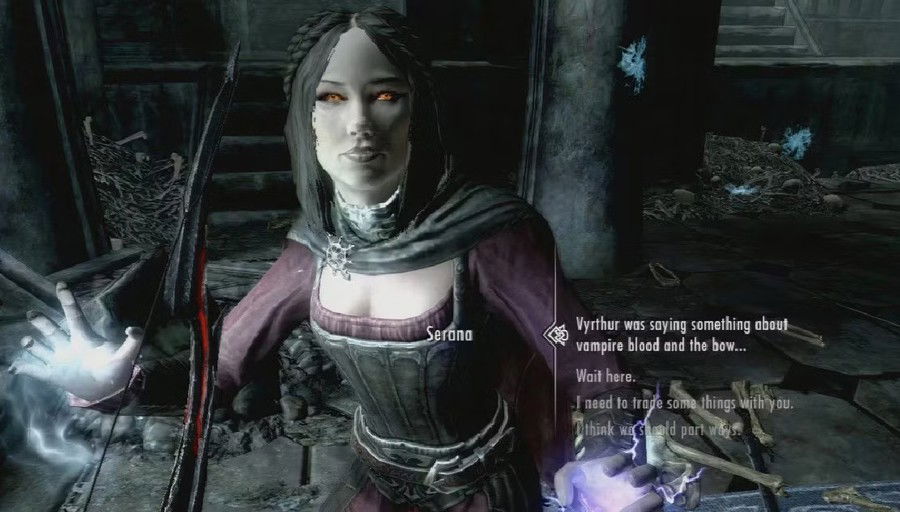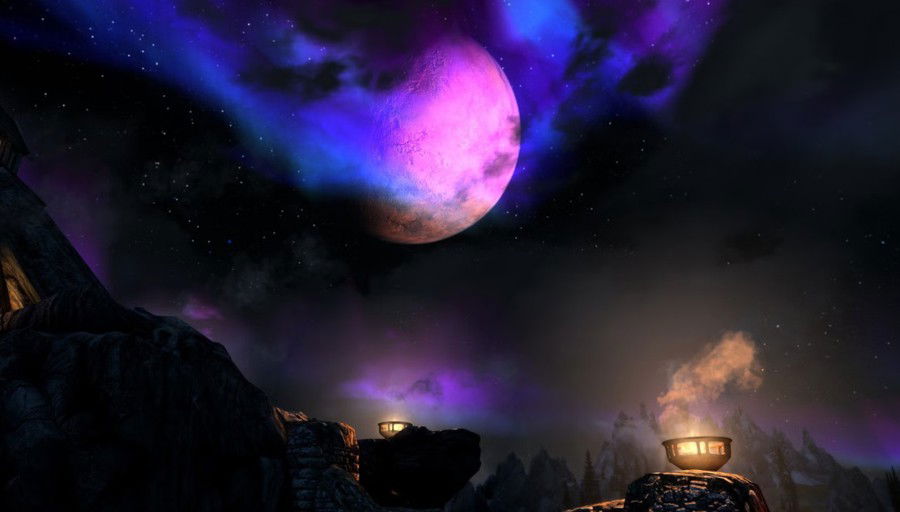I'm sure you've heard this phrase before: "I used to be an adventurer like you, then I took an arrow in the knee."
Whether in a video, a meme with that caption, or somewhere else, you’ve certainly seen it. You know what a “fus ro dah” is. You’ve seen funny videos where someone puts a bucket on another person’s head and starts robbing them. And the music? That choir of voices in a style reminiscent of old Nordic chants, sung in the game’s own language?
There’s no denying that The Elder Scrolls V: Skyrim, released by Bethesda in 2011, is a global phenomenon that few games have ever reached! You can easily place the Dragonborn alongside gaming icons like Doomguy, Geralt of Rivia, and Duke Nukem. He may not be as universally recognized as Mario or Sonic, but the iconic horned helmet and the shout “fus ro dah” are undeniably part of gaming history.
The question is: How and why? Why did Skyrim become such a massive success? Why does it keep getting re-released - even on smart fridges (yes, really)? It's certainly not because of Bethesda’s polish in their releases. Skyrim launched with a slew of bugs that still haven’t been fixed!
Let’s talk about the reasons Skyrim has remained relevant from 2011 through to 2025, with a massive fanbase to this day. And if you have questions or more reasons, just drop a comment!
Longevity and Lasting Popularity
Since its release in 2011, Skyrim has achieved something very few games manage: staying relevant and widely played for over a decade. Console generations have come and gone, new titles have emerged with better graphics, deeper mechanics, and larger worlds - yet Skyrim remains a go-to for players of all ages.
It has truly stood the test of time, something even critically acclaimed games often fail to do. Few titles manage to maintain such an engaged fanbase without the support of regular updates or competitive online modes.
According to Todd Howard, game director at Bethesda, Skyrim still draws millions of monthly players and has sold over 60 million copies. That ongoing interest is one of the key reasons it has been re-released so many times, and across at least eight different versions and platforms.
The community often jokes about this, turning all the re-releases into a meme. But in practice, it means the game is always available. It never disappears from store shelves or digital storefronts. With each new generation of players and consoles, Skyrim continues to find a place.
This constant rediscovery keeps the game alive. And impressively, it happens without giant marketing pushes or overhyped promises: Skyrim stays relevant on the strength of its own open world, exploration, and freedom of choice.
Even as more advanced RPGs come along, Skyrim still attracts new players; not just because of nostalgia, but because it offers something uniquely enduring.
This level of staying power is extremely rare in the gaming industry. Most games, even wildly successful ones, fade away once their initial wave passes. Support ends, players move on, and the game is eventually forgotten. Skyrim breaks that trend. It has reinvented itself through its fanbase and pop culture, further strengthening its legacy.
Accessibility Through Re-Releases
One major reason Skyrim has endured is its incredible accessibility. Since 2011, it’s been re-released countless times across nearly every platform imaginable. You can quite literally play Skyrim on a fridge - it’s a meme, but not too far from reality.
It started on PlayStation 3 and Xbox 360, moved to PC, then got special editions for PlayStation 4 and Xbox One, arrived on Nintendo Switch, and was later optimized for the PlayStation 5 and Xbox Series X|S. There’s even a VR version.
This strategy ensures the game is always available. Re-releases keep it visible and easy to access, letting new players discover it and longtime fans return. There's always an excuse to dive back into that world.
This ongoing presence is key. Skyrim remains relevant not just because of nostalgia, but because of its constant availability. Wherever you are, whatever system you use, Skyrim is probably there waiting for you.
Modding Community
A huge part of Skyrim’s continued success is its modding community, particularly through platforms like Nexus. Since launch, fans have created tens of thousands of mods that enhance, alter, or completely reinvent the original experience. With nearly 100,000 mods across platforms, the creativity is unmatched.

Even though Skyrim has a main storyline, the game is designed to be continuous. Side quests, procedural content, and random events make exploration feel endless.
Mods range from visual upgrades and improved combat systems to massive fan-made expansions that rival official DLC. Some add survival mechanics, others turn Skyrim into a strategy game. Some projects, like Skyblivion, aim to recreate entire previous Elder Scrolls titles using Skyrim’s engine.
This freedom ensures that no two playthroughs ever feel the same. Even if you’ve explored the entire map and completed the main story, there's always something new to try: new builds, stories, mechanics, or entirely different aesthetics.
Bethesda’s official mod support, available even on consoles, has helped preserve that creative spark. Skyrim is no longer just a game; it’s a foundation upon which players can build their own experiences.
Balance Between Depth and Accessibility
Skyrim achieves a rare harmony between complexity and ease of play. It offers a rich world with countless quests, characters, and moments like Serana from the Dawnguard DLC, a fan favorite (especially for turning you down in such a memorable way).

Yet it avoids becoming overly complicated. Unlike older Elder Scrolls games like hyperlink, Skyrim doesn’t force players to pick rigid classes or locked-in builds. Instead, your character evolves naturally based on how you play.
You become better at sneaking by sneaking, improve magic by using it, and level up your sword skills by swinging weapons. It’s intuitive and rewarding.
This approach makes the game accessible to newcomers and deeply satisfying for veterans. Players can dive deep into the numbers if they want or just explore and enjoy the story. Skyrim adapts to your playstyle, not the other way around.
This blend of freedom and structure is one reason it appeals to such a broad audience. It bridges the gap between hardcore RPGs and mainstream appeal in a way few games have managed.
Cultural Impact
Skyrim isn’t just a game, it’s part of gaming culture. Even people who’ve never played it have likely heard the quote "I used to be an adventurer like you, then I took an arrow in the knee." Repeated by countless NPCs, it quickly became a meme, showing up in videos, comments, and internet jokes.

And that’s just one example. Skyrim’s world is filled with quirky moments that became iconic. Like the player who puts a bucket over a shopkeeper’s head to steal everything in sight. Or dragons flying backward. Or getting launched into orbit by a giant’s club. Or the infamous flying mammoths.
While many games try to hide their bugs, Skyrim embraced them (or at least its players did). These glitches became part of its charm and helped fuel the online conversation. They weren’t game-breaking, they were hilarious and memorable.
This helped Skyrim become more than a game. It became a shared experience, a cultural touchstone among gamers.
Conclusion
The Elder Scrolls V: Skyrim offers one of the most vibrant open worlds in gaming. Behind every stone and inside every house lies something new to discover. The main quest is compelling, but many side stories are just as unforgettable. Some players even ignore the main storyline entirely.
Few games manage to stay relevant, complete, and enjoyable for as long as Skyrim. Whether it’s because of Bethesda’s world-building or the freedom to shape your own journey, it’s clear that something special happened with this game.
And so we keep exploring Tamriel’s frozen north, shouting “fus ro dah” as loudly as we can.
Do you agree? Disagree? Leave a comment.











— Comments 0
, Reactions 1
Be the first to comment